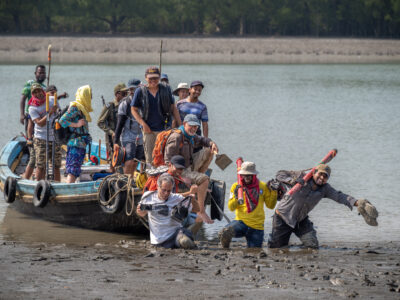We first reported about the project by a group of Puerto Rican high school students, Project H2O (Help to Others), and the documentary film about the project being made by the parents of one of the students, in August 2010. At that time one of the student organizers Cecilia Graña-Rosa and her parents were visiting Columbia Water Center to interview Upmanu Lall and Paul Block about water scarcity issues for the film.
We recently received an update on the project, which included this trailer for the full documentary, which is still being completed:
The students are continuing to develop Project H2O in their school, in an educational phase that looks at not only global water scarcity, but also water issues at home in Puerto Rico. These are some of the highlights they shared with us (emphasis added):
-
- Puerto Rico’s present situation concerning accessibility to freshwater and adequate sanitation is a matter to worry about. There are many communities in our Island that are not connected to PR Aqueduct and Sewage Authority (PRASA) and suffer from shortage of water as well as water borne diseases that are preventable. Approximately 5% of the Puerto Rican population is living in 246 non-PRASA communities. They are battling for secure access to clean water and to proper and healthy sanitation facilities. We visited one of these rural non-PRASA communities in San Germán, to the west of PR, pursuing to learn about its living condition in relation to fresh water. By contacting the Dept. of Civil and Mechanical Engineering of the University of PR at Mayaguez, we were not only able to see how the experimental drum filtration/chlorination system used by this community works, but actually carried out ourselves some water sampling and analysis, with the guidance of Prof. Sanghul Hwang and other students from the University. Most importantly, we met with some community members and talked about the positive changes this filtration system has brought to their daily lives.
- We have concluded that it is crucial to understand how our country, as a whole, perceives the impending water crisis in the world. Do people have a basic knowledge of the state of this essential resource? We need to survey this knowledge in order to understand the scope of required education and then develop a strategy to engage people into looking for solutions of such looming crisis. The tool developed to assess this knowledge or lack of it, was to conduct surveys. More than 750 subjects have answered our survey and our goal is to double this figure by Summer 2011. An interesting and immediate result these surveys brought about was that our group noticed most people were actually interested in the water situation. Once a person had finished filling the questionnaire out, he/she was in a better attitude to learn from us the correct answers. Our survey, initially thought as a tool to measure how much “water knowledge” people had, transformed itself into an instrument to educate and engage the community.

- Research has continued in Puerto Rico and we have learned that another important non-PRASA community is the in town of Patillas. We have met with Dr. Graciela Ramírez, Head of CECIA (Center for Environmental Education & Conservation) and professor of the Interamerican University of PR, at Bayamón who is an expert on this fresh water-scarce community. She has thoroughly educated us about the development of CECIA’s action plan to help Patillas. The next step is to visit the Patillas community on March 2011, accompanied by her and some members of the EPA to learn about the particularities of their fresh water needs. Our goal is to help this community to obtain access to clean water and live a healthy life.
- We are planning to hold a Walk for Water event during May 2011. Its main focus will be to promote water awareness. We will walk a few miles by the beach carrying 1 to 5 gallons containers of seawater so people can feel the heavy burden of walking long distances for water. We will return the water to the ocean after reaching our destination and there will be a discussion on water saving options, and other related issues.
- To crown our four-year community service trajectory, we have been awarded the 2011 AWWA National Merit Award, which we will receive during their international 130th Annual Conference & Exposition “The World’s Water Event” this summer in Washington, DC. We feel honored that our achievements have called the attention and recognition of such globally recognized organization. (AWWA report)
In addition, The Governor of Puerto Rico, Luis G. Foruño, nominated the project to the EPA, “to be considered for the President’s Environmental Youth Award. The student co-founders of the project, Cecilia Graña-Rosa, Nicole Ray and Carlos Nevárez from St. John’s School in Puerto Rico, have taken it upon themselves to promote awareness of lack of access to clean water that affects so many people around the world…. Their ambitious agenda of educational events and community rescue efforts for 2011 show a successful this project has become, the great impact it has already generated, and the significant potential it has to grow even more in the future.”
CWC was also pleased to hear that after her visit to us, Cecilia, who is graduating from high school this spring, is considering Columbia University for her undergraduate education. Best of luck!
Project H2O continues to be an inspiring example of individuals making a difference, and that age is no obstacle!
—
Columbia Water Center demonstrates research-based solutions to global freshwater scarcity. Follow Columbia Water Center on Facebook and Twitter



